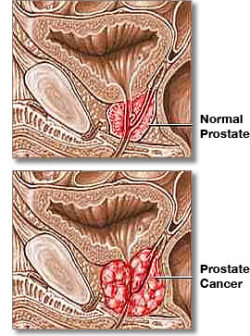Prostate Cancer
Prostate cancer is a highly treatable cancer. 
The general statistic about prostate cancer is that 80 per cent of men aged 80 and older develop prostate cancer. And because there are symptoms developed after the age of 50 in most men, this suggests that with vigilance any man who is vulnerable through genetics or family history, and certain lifestyle choices and habits, he may be able to maintain prostate health and remain cancer-free. The following article describes a range of subtopics under the heading of prostate cancer.
The Nature of Prostate Cancer. Abnormal cell growth in the male prostate gland is the measureable cancerous condition. The condition is common in males aged 65 and over. Prostate cancer is a progressive disease. The gradual enlargement of the male prostate does not definitely mean the patient will develop prostate cancer. Men can go years with enlarged prostate in a condition known as benign prostate hyperplasia. Symptoms can be managed with lifestyle and medication augmentations. Prostate cancer is very treatable and need not be fatal with early detection. Age, familial history and ethnicity can play a part in any prostate cancer profile and the degree of risk of prostate cancer. Diet is being researched as a risk factor, where high fat diets may be a risk factor for developing prostate cancer.
Symptoms of Prostate Cancer
Urinary difficulties are common to men with prostate cancer and men with an enlarged prostate condition that isn’t cancerous- benign prostate hyperplasia or BPH. Prostate cancer in its primary stage doesn’t manifest any symptoms. There may be difficulty experienced by the patient in urinating with normal frequency, flow, and regularity.
Prostate Cancer Diagnostics
The digital rectal exam is the most relied upon method for early cancer detection. By probing the rectum of a male patient using a well-lubricated, latex encased “digit” or finger, the doctor is able to determine the relative size and displacement of the prostate gland. The closer to the anal opening the larger the gland—there is an estimated tolerance as to what that distance should be which the doctor uses as an estimate to determine how enlarged the prostate gland has become or not. Usually, as part of a standard blood panel work up for the routine annual physical the doctor will call for a prostate specific antigen test to measure protein cell levels in the prostate gland. An elevated reading on the “PSA” results will indicate a cancerous or pre-cancerous condition. The elevated PSA result will confirm the need for a biopsy to test glandular tissue.
Surgical Considerations
Prostate cancer can spread to other parts of the body especially into the rectal area, bladder and other proximities. Should prostate cancer spread the risk of death increases dramatically. The cure rate for prostate cancer, the five year survival rate, is quite high if the cancer is contained within the prostate gland. This medical fact, and the probability of death should the cancer spread from the prostate, are primary reasons why prostate gland removal- either full or partial- is the preferred solution.
